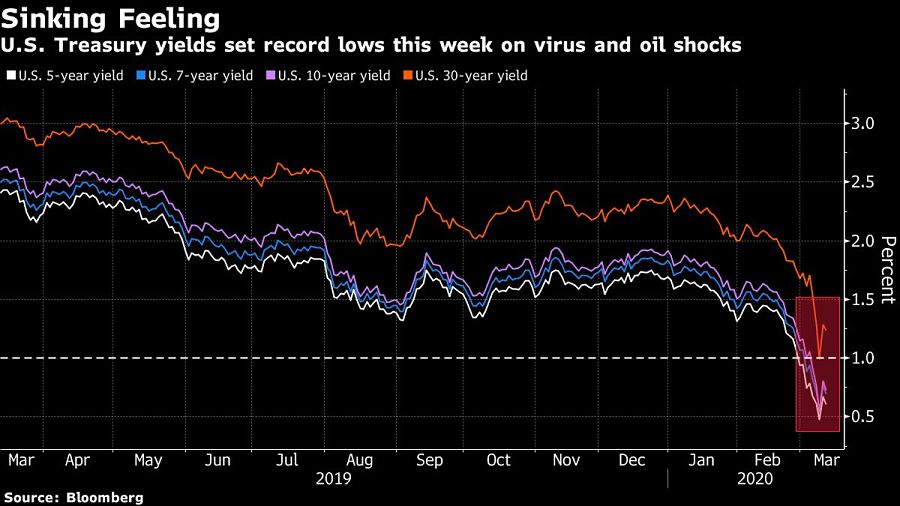

Cratering U.S. Treasury yields may be eroding the haven quality of some of the world’s safest assets, according to a growing chorus on Wall Street.
Goldman Sachs Group Inc. says the coronavirus panic-driven plunge in yields makes the sovereign debt vulnerable to a correction, while BlackRock Investment Institute said Treasuries are getting weaker as protection when stocks sell off. Cash and bills may be the better defensive bet now, according to Tallbacken Capital Advisors.
“One question to ask is if nominal bonds still carry the same insurance value,” Goldman analysts Praveen Korapaty and Avisha Thakkar wrote in a note. “Unless central banks show a willingness to cut deeply into negative territory, we think the answer is no, at least for the larger bond markets like the U.S., euro area and Japan.”

Yields on 10-year Treasuries have plummeted as much as 160 basis points this year, reaching a historic low of 0.31% on Monday as soaring virus infections globally and a shock price war between the world’s biggest oil producers sent investors rushing for shelter.
They have moved more than 10 basis points for each of the past five days. The Bank of America Merrill Lynch MOVE Index, which measures implied price swings in Treasuries, rose Monday to its highest level since June 2009.
‘Great profits’
Investors who bought longer-dated U.S. bonds would have made “great profits,” but now may be the time to sell, according to Michael Purves, chief executive at Tallbacken.
“We think there is risk of aggressive profit taking and for yields at the back end to rise,” Mr. Purves wrote in a note. “We suggest cash/bills is the real safe haven right now, and not the 10 or 30 year.”
Diminishing buffer
Still, count the world’s biggest money manager among those touting increased caution about the asset class.
While BlackRock favors Treasuries over lower-yielding peers, it’s increasingly wary of their effectiveness as a hedge as daily market swings become more volatile.
“We recognize Treasury allocations are playing their role during moments of high uncertainty, but see risks of a diminishing buffer against equity market sell-offs and a snap-back in yields from historically low levels,” according to a Tuesday note from the company.
M&G Investments recently sold some Treasuries, partly due to the potential for sharp corrections, said Pierre Chartres, fixed-income investment director in Singapore.
“Ten-year U.S. Treasuries yielding 0.8% is not good value in an environment where the situation normalizes,” he said. “Yields will start to rise again, and you can make some capital losses by owning Treasuries.”

Rajesh Markan earlier this year pleaded guilty to one count of criminal fraud related to his sale of fake investments to 10 clients totaling $2.9 million.

From building trust to steering through emotions and responding to client challenges, new advisors need human skills to shape the future of the advice industry.

"The outcome is correct, but it's disappointing that FINRA had ample opportunity to investigate the merits of clients' allegations in these claims, including the testimony in the three investor arbitrations with hearings," Jeff Erez, a plaintiff's attorney representing a large portion of the Stifel clients, said.

Chair also praised the passage of stablecoin legislation this week.

Maridea Wealth Management's deal in Chicago, Illinois is its first after securing a strategic investment in April.
Orion's Tom Wilson on delivering coordinated, high-touch service in a world where returns alone no longer set you apart.
Barely a decade old, registered index-linked annuities have quickly surged in popularity, thanks to their unique blend of protection and growth potential—an appealing option for investors looking to chart a steadier course through today's choppy market waters, says Myles Lambert, Brighthouse Financial.
